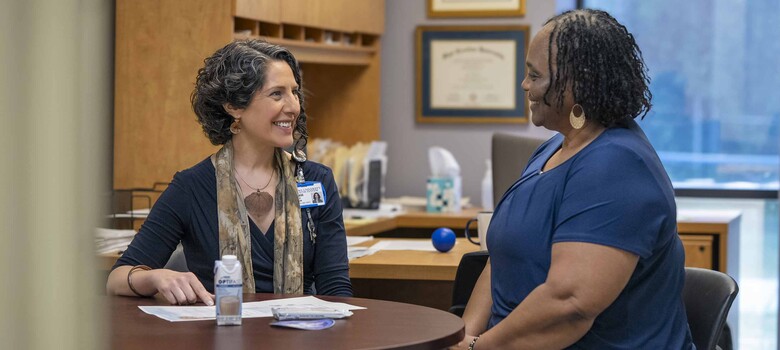 From the DukeHealth.org archives. Content may be out of date.
From the DukeHealth.org archives. Content may be out of date.
Why It’s So Hard to Quit Smoking
Nicotine Researcher Shares Personal Experience with Quitting

Duke nicotine researcher Joseph McClernon, PhD
Duke researcher Joseph McClernon, PhD, spends his days studying nicotine addiction in hopes of finding new ways to help people quit smoking and live healthier lives. He knows firsthand how hard it is to kick the habit, and shares his struggle to stop smoking. His story coincides with Duke Health's partnership with the NC Alliance for Health in support of Race to Quit, NC. The campaign, which runs from Oct. 5-9, reminds smokers that it’s never too late to quit.
Race to Quit NC Reminds Smokers It's Never Too Late to Quit
It's been six-plus years since North Carolina legislators banned smoking in public places like bars and restaurants. But more than 20 percent of NC residents are still smoking -- higher than the national rate of 18 percent. So many smokers want to quit but just can’t seem to beat the addiction.
Every day, scientists like Duke clinical psychologist Joseph McClernon, Ph.D., are working on ways to help them quit and live healthier lives.
McClernon grew up in the 1970s in the Ozarks of southern Missouri. While there were some smokers in his extended family, he grew up in a nonsmoking household. Still, it was a time when people smoked not just in restaurants but nearly everywhere, he said. He smoked his first cigarette at age 17, and at one time was a pack-a-day smoker.
Here, McClernon recounts his own experience, explains why it's so hard to quit, and offers advice on how to get help.
Why Did You Choose Smoking Addiction as Your Career?
By coincidence, my first job out of college was at a research institute where they studied the psychology of smoking. Based on my own personal experiences, I wanted to know how people like me could know that smoking will kill us, but continue to do it anyway.
How Did You Quit?
I quit 15 years ago, right before the New Year. Every time there was a cold or flu going around, I would catch it. I was sick all the time, and I believed that smoking was weakening my immune system and making me more susceptible to cold after cold. I had tried to quit smoking before with no success but this time I felt like I just had to stop.
I quit cold turkey, which I had done before and failed, and for that reason I would not recommend it as a strategy, particularly with all of the treatments we now have available. When I look back on it, I should have used a nicotine patch, counseling, and other strategies to make the process easier and increase my chances for success the first time. It took a good couple of months to feel like I was in the clear and had actually quit for good.
Why Is It So Hard to Quit?
Addiction happens in the brain. Nicotine and other drugs hijack the brain’s existing reward systems, and when we experience something we like, we are really good at remembering where and how it happened, and how to get that feeling again. With an addiction, we may seek that rewarding feeling again at the expense of other natural rewards. Our brain becomes very focused on getting the drug.
What Tools Are Available to Help People Quit Smoking?
First of all, I know from experience that it won’t be easy, but if you are a smoker, the most important thing you can do for your health and for the health of your family is to quit. Part of the quitting process is getting to a point where you really want to make that change in your life and we are lucky in North Carolina to have access to a lot of the right resources, like QuitlineNC (1-800-QUIT-NOW).
There are are other tools that can help minimize the rocky process that many people experience while trying to quit smoking. There’s planning and counseling, a wide array of over-the-counter nicotine replacement products like the patch, gums and lozenges. You can also talk with your doctor about prescription drugs that have been used to help smokers quit.
What Are Scientists Doing to Make Quitting Easier?
I have been studying nicotine addiction for 23 years. One of my focus areas is understanding withdrawal and gaining a better understanding of changes in the brain and body during withdrawal and cravings for cigarettes. Our lab at Duke is also examining how situations and places associated with smoking can lead to relapse and developing strategies to help in those situations. We also know that although 18 to 20 percent of the general population smokes, people with mental illness are disproportionately burdened by nicotine addiction. For example, people with schizophrenia are three to four times more likely to smoke. There are also strong relationships between smoking and depression, ADHD, and post-traumatic stress disorder. My colleagues and I are working toward identifying treatments that help these smokers specifically.
We are increasingly focused on developing new ways to help smokers stop, such as new ways of supporting patients, behavioral strategies and techniques that lessen someone’s dependence on nicotine before the actual day they quit.
We are doing new research all the time. Anyone interested in learning more about a quit-smoking trial can call us at (919) 684-9593.


